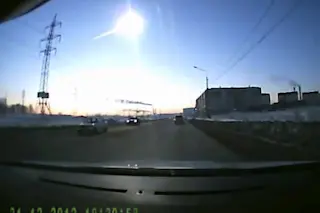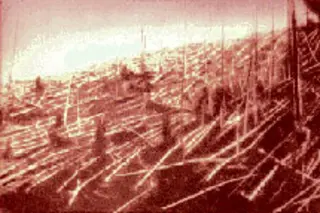Screen capture of a video showing a meteor streaking above the Russian city of Chelyabinsk. Click for the video. [Update: I've included below new information from the Russian Academy of Sciences, including an updated estimate of the size of the meteor.] I woke up this morning to news of a meteor leaving a trail of fire and smoke over the Russian city Chelyabinsk, near the Urals. Click on the screen capture above for dramatic video of the event. RT.com is reporting that about 950 people have sought medical attention in the city. The meteor was first estimated to have weighed 50 tons before entering the atmosphere. Russian scientists now are putting it at 10 tons. Here is the latest information about the meteor from the Russian Academy of Sciences (translated into English by Google's auto-translation feature, with a little editing for clarity):
We estimate the size of the body was ...




